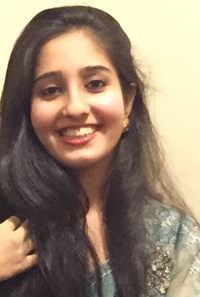Change username form. Insert an info and press enter to submit, or press escape to close.
Create a new account form. Press escape to close.
Validate mail form. Press escape to close.
Lost password form. Insert an info and press enter to submit, or press escape to close.
Confirm address message dialog. Press escape to close.
IMA’s “MyCMA” series spotlights valued members of the CMA® (Certified Management Accountant) community. Learn about their journey with the certification—and get tips on advancing your own. This issue’s featured CMA is:
 |
Name: | Bakhtawar Savul |
| Company: | Escribir College of Advanced Studies | |
| Title: | Academic Manager | |
| Location: | Karachi, Pakistan |
-
How did you first come across the CMA and what made you decide to go for it?
I was working for PwC (PricewaterhouseCoopers), and I realized I wasn’t only interested in public accounting. I loved doing decision analysis, costing, and consulting, which was my favorite. I already was an ACCA (Association of Certified Chartered Accountants) affiliate, but I did a Google search to find which certification could enhance my management skill set. Of all the options I came across, I chose the CMA as I found it to be a perfect blend of the 11 most important management accounting dimensions. In addition, it was more globally recognized, and it gave me the option of possibly relocating one day.
- In what ways has CMA made an impact on your career or professional journey?
Pursuing the CMA has made me a more focused person. I know where I see myself in the future, and I know what I need to do. I’ve opted to be in academia for the time being because of my love of teaching, but eventually I would like to have my own firm or even become the CEO of a manufacturing/pharmaceutical company. The enhanced skill set that the CMA has given me is my biggest asset, as it’s provided me with a platform that can lead to fulfilling my dreams.
I think these dreams are more likely to come true with a good start to my career. I was 23 when I passed the exam, and the CMA let me distinguish myself from other new grads at a very early age. I got more opportunities because I was more preferred over non-CMAs. I got more interview calls than I did before, and I found that hiring managers were fascinated with the CMA. Even after I was hired, because of my skill set, my managers trusted me more with work—I could deliver results more efficiently and they could rely on me.
- What is your proudest career moment or milestone as a CMA?
I took both exams within four months of each other, and I passed them on my first attempt. I had to balance studying with a hectic work schedule. We had so many deadlines at PwC, and I found myself studying late nights, sometimes only getting three hours of sleep.
Another challenge was dealing with pressure and discouragement from others. I got a lot of comments like, “Oh, that’s too difficult. You can’t do it. Why are you pushing yourself now – you can take the exam later at any time.”
But I didn’t listen to the discouragement – didn’t take any of it to heart. Instead, I took it as a challenge. I stayed focused and committed, and I decided to ignore the negative comments. I’m glad I did, because passing the CMA exam has made me realize my potential.
- What’s the best piece of advice you would give to CMA hopefuls?
They should know that the exam is hard, but it’s an investment that’s very worthwhile. This investment is apparent year after year and leads to more and more rewards. It’s important to look at the bigger picture—to understand your long-term goals.
I also think that one degree isn’t enough. The job market is very competitive, so you need to distinguish yourself. There’s no limit to education – success is a journey and not a destination.
- For those taking the exam, what study tip(s) can you share?
I teach ACCA candidates, and I tell them, “To pass an exam you need to be committed from the heart.” My other study tips are:- Some students study selectively. Study the whole course. There is no selective testing.
- Be very conceptual in your studying. Only when you grasp the concept can you implement it in your workplace. If you just study for the sake of passing the exam, it won’t be beneficial. It simply won’t work out.
- Make a study routine. Maybe you study more on Sunday and take a break on Saturday. Forming a plan keeps you disciplined and helps you avoid procrastination.
- If you could have one superpower in the world, what would it be?
In my country [Pakistan], we have a lot of poverty. We see people with dreams but who don’t have the resources to fulfill those dreams. If I had to pick one superpower, I’d want to bring smiles to every face in the world. I’d want to put an end to all sadness, discrimination, and poverty. I’d want to turn people’s dreams into reality.
Right now, I volunteer with Michelle Obama’s “Let Girls Learn” initiative. We empower women, help them with their personal and professional development, and teach them how they can bring innovation into business. For example, if a school is struggling with developing a good, hygienic cafeteria, we show them how they can sell home-cooked food to the school and turn this obstacle into a business idea.
Discrimination and discouragement prevent people from reaching their potential. I want to inspire others and help them fulfill their aspirations.
Share YOUR Story
We’d love to hear your CMA story! Please contact Margaret Michaels, manager of brand content and storytelling, at margaret.michaels@imanet.org or (201) 474-1614.
